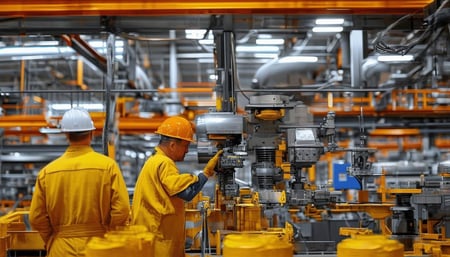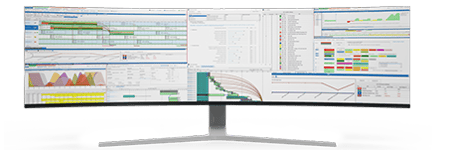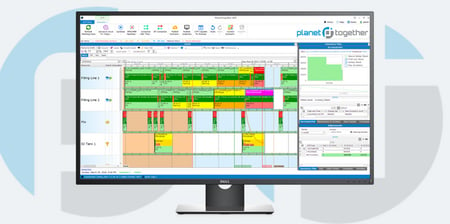Balancing Cost, Quality, and Output
As a Plant Manager in the industrial manufacturing sector, you are continually tasked with juggling three critical objectives: minimizing costs, maintaining quality, and maximizing output. Striking a balance between these priorities is often challenging, especially with growing market competition, rising operational costs, and ever-evolving customer demands.
Integration of advanced scheduling and planning solutions, like PlanetTogether with ERP giants such as SAP, Oracle, Microsoft, Kinaxis, or Aveva, can be instrumental in streamlining operations, reducing costs, and enhancing both quality and productivity.
In this blog, we’ll explore strategies to achieve a balance among cost, quality, and output and discuss how integrating PlanetTogether with robust ERP systems can be a game-changer for your plant operations.

Understanding the Cost-Quality-Output Triangle
Before looking into strategies and technologies, it’s essential to recognize that cost, quality, and output are interdependent variables. Adjusting one often impacts the others, creating a “triangle” of competing priorities. However, with the right tools and an optimized approach, this balance can lead to a robust and agile manufacturing process capable of meeting both business and customer expectations.
Cost: In industrial manufacturing, controlling costs isn’t just about minimizing expenses—it’s about efficient resource allocation, waste reduction, and process optimization. Cost control must extend beyond raw materials to include energy use, labor, equipment maintenance, and logistics.
Quality: Delivering high-quality products is non-negotiable, as it influences customer satisfaction, brand reputation, and regulatory compliance. Achieving quality standards while controlling costs and output demands a fine-tuned approach to process management and resource allocation.
Output: High output is vital to meet customer demand and maintain competitive advantage. However, increasing output without compromising quality or inflating costs is a common challenge. Optimizing schedules, reducing machine downtime, and enhancing labor efficiency are all strategies that contribute to effective output management.

Challenges in Balancing Cost, Quality, and Output
Several challenges hinder the delicate balance between cost, quality, and output in industrial manufacturing:
Resource Constraints: Limited workforce, materials, or machine availability can lead to production delays, increased costs, and compromised quality.
Variable Demand: Market demands can fluctuate, making it hard to maintain output levels without stockpiling or expediting shipments, both of which can impact costs.
Supply Chain Disruptions: External factors, such as delays in raw material shipments, can disrupt production schedules, leading to quality and cost-control challenges.
Regulatory Compliance: Strict industry standards and regulations may require costly adjustments to production processes or material sourcing, impacting the cost-quality-output equation.
![]()

Leveraging PlanetTogether for Optimal Production Scheduling
PlanetTogether’s Advanced Planning and Scheduling (APS) system offers a strategic approach to balancing cost, quality, and output in industrial manufacturing. By integrating it with ERP systems such as SAP, Oracle, Microsoft, Kinaxis, or Aveva, you can create a more cohesive and responsive manufacturing environment.
Dynamic Scheduling: With PlanetTogether, you gain a real-time view of production schedules, resource allocation, and inventory levels. By integrating this with SAP, for example, you can automate scheduling adjustments based on fluctuating demand, machine availability, or raw material shortages, enabling you to react faster and more cost-effectively.
Optimized Resource Allocation: The integration helps manage resources by aligning production plans with available personnel, machines, and materials. This approach can reduce overtime costs and prevent underutilization of resources while maintaining high output and quality.
Enhanced Quality Control: Integrated scheduling allows for quality checks at critical production stages. Through ERP integration, such as with Oracle or Microsoft, you can incorporate real-time quality monitoring, ensuring issues are identified and addressed quickly without impacting overall output.
Predictive Maintenance: PlanetTogether can analyze production data to schedule predictive maintenance, helping to avoid unexpected equipment breakdowns. When integrated with Aveva’s asset management tools, for instance, this allows maintenance to be conducted at optimal intervals, minimizing downtime while preserving production quality and output.

Strategies to Balance Cost, Quality, and Output
While technology plays a significant role, a few strategic approaches can help achieve the balance you’re aiming for:
Adopt a Lean Manufacturing Mindset
Lean manufacturing principles emphasize waste reduction, continuous improvement, and efficient resource use, making it an ideal framework for balancing cost, quality, and output.
Process Optimization: Review and streamline processes to eliminate unnecessary steps, reducing costs without compromising quality. Using PlanetTogether with an ERP like SAP can provide visibility into where these efficiencies can be made.
Inventory Management: Excess inventory ties up capital and increases holding costs. An ERP-integrated scheduling system can align inventory levels with production needs, ensuring materials are available without overstocking.
Implement Just-in-Time (JIT) Production
Just-in-time production focuses on producing only what is needed when it is needed, reducing storage costs and minimizing waste.
Real-Time Data Utilization: Integration between PlanetTogether and ERPs like Kinaxis enables real-time inventory tracking, so materials are ordered and consumed in alignment with production demands, lowering costs and ensuring quality materials are always available.
Flexibility in Production: JIT requires flexibility to adapt schedules quickly. PlanetTogether’s dynamic scheduling, when synced with ERP data, can adjust production sequences on the fly to meet changing demands without sacrificing quality or output.
Invest in Employee Training and Development
A well-trained workforce can make a substantial difference in balancing cost, quality, and output. Employees should be skilled in operating machinery, managing quality standards, and optimizing resource usage.
Data-Driven Decisions: Integrating PlanetTogether with Microsoft’s analytics solutions, for example, empowers employees with data-driven insights into production status, quality indicators, and resource utilization. This approach fosters proactive decision-making and reduces the risk of costly errors.
Continuous Improvement Culture: Encourage employees to identify areas for improvement. With access to integrated production data, teams can make informed suggestions that align with business goals and positively impact the cost-quality-output balance.
Use Predictive Analytics for Proactive Management
Predictive analytics can provide insights into potential production bottlenecks, maintenance needs, and supply chain disruptions.
Early Issue Identification: Integrating PlanetTogether with Aveva’s predictive analytics allows for early detection of issues, reducing unexpected costs and ensuring quality standards are met. This proactive approach helps maintain output without incurring additional expenses or quality risks.
Optimize Equipment Efficiency: Predictive maintenance reduces machine downtime and extends asset life. Through integrated data, production schedules can be adjusted to account for maintenance needs without impacting delivery timelines or output.

Practical Benefits of ERP-Integrated APS Systems
The integration of PlanetTogether with an ERP system—whether SAP, Oracle, Microsoft, Kinaxis, or Aveva—provides a holistic approach to production planning and execution, delivering tangible benefits for plant operations:
Enhanced Collaboration: Real-time data sharing across departments improves collaboration, ensuring production schedules, inventory levels, and quality checks are aligned.
Greater Transparency: ERP integration provides comprehensive visibility into all aspects of production, helping you make more informed decisions that balance cost, quality, and output.
Scalability: As your plant grows or market demands shift, an integrated system allows you to scale operations while maintaining balance across key priorities.
Improved Decision-Making: With real-time insights into production status, quality metrics, and cost factors, you can make adjustments that keep operations optimized without overextending resources.
In industrial manufacturing, achieving the right balance between cost, quality, and output is an ongoing challenge that demands both strategic foresight and tactical precision. With the integration of PlanetTogether and ERP systems like SAP, Oracle, Microsoft, Kinaxis, or Aveva, you gain the tools to streamline operations, optimize resources, and enhance quality control, creating a more agile and efficient production environment.
As a Plant Manager, embracing these advanced scheduling and planning solutions is a proactive step toward achieving a harmonious balance between your key production goals. By prioritizing a data-driven approach and leveraging the power of integrated technology, you can steer your facility toward sustained growth, improved profitability, and a resilient position in today’s competitive market.
Are you ready to take your manufacturing operations to the next level? Contact us today to learn more about how PlanetTogether can help you achieve your goals and drive success in your industry.
Topics: Industrial Manufacturing, PlanetTogether Software, Integrating PlanetTogether, Optimized Resource Allocation, Dynamic Scheduling, Enhanced Quality Control, Adopt a Lean Manufacturing Mindset, Implement Just-in-Time (JIT) Production, Invest in Employee Training and Development, Use Predictive Analytics for Proactive Management




















LEAVE A COMMENT